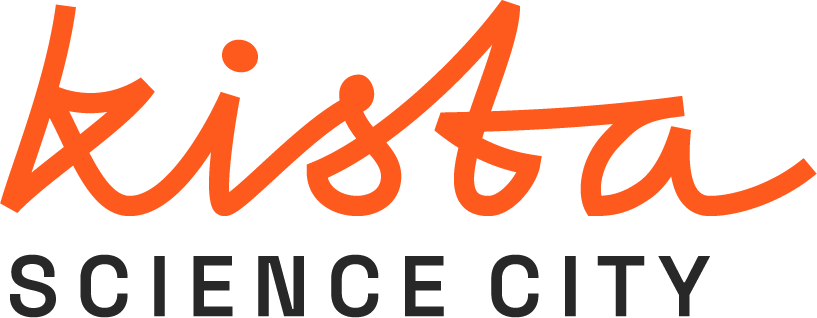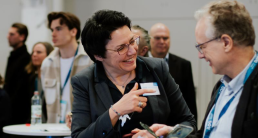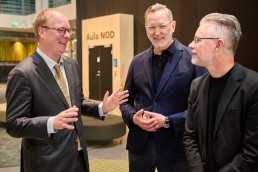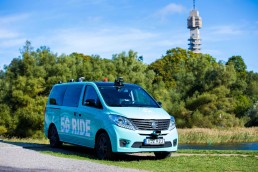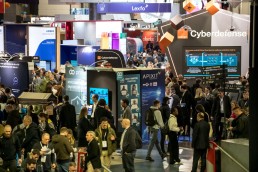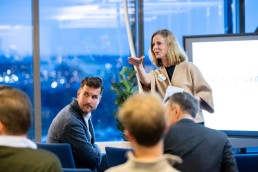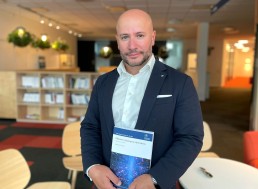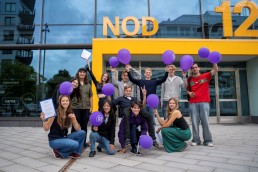New business opportunities above the clouds
StickyJune 4, 2023articleKista Science City,Space
Together with Cassini matchmaking, we recently hosted the Cassini Space event “Exploring the EUSpace ecosystem”, showcasing the top EU space startups and scaleups from Sweden and Europe, as well as local space and non-space companies. The event highlighted the rapidly expanding field of space technology and the numerous opportunities it presents.
During half a day, we provided a dynamic platform for startups to showcase their innovative ideas, alongside presentations from leading space companies exploring the industry’s latest trends.
Tomas Jonsson, from the EU DGDEFIS (European Commission Defence Industry and Space) , shared insights into the European space ecosystem, a panel discussion on new business opportunities in the space industry, featured experts such as William Johansson, from the Swedish Space Corporation, Ted Elvhage from Rymdkapital, and Hannes Eder, from KTH Innovation. Finally, Fredrik Sjöberg shared OHB Swedens’ experience of the growing market of space. “We have been building satellites for a long time and have the competence. Now we also need to find new colleagues as the market expands”, Fredrik explained.
Engaging pitches from startups as: HyImpulse, Ntention, ReOrbit, SuperAnnotate, Forsway, Ecaps AB, Neutron Star Systems, Vimotek AB, AcTLAbS, Dreamwaves, Pythom Space and Hybrid-Airplane Technologies GmbH demonstrated a wide range of creative ideas emerging in the industry.
Another highlight of the day was the matchmaking session, offering opportunities for one-on-one meetings between startups, corporates, and investors, laying the foundation for new partnerships shaping the future of space tech.
Karin Bengtsson, CEO of Kista Science City expressed her enthusiasm saying, “We are thrilled to witness the energy and passion from this vibrant space tech cluster in Kista, and fully committed to continuously support the growth of this innovative sector in our community. Through events like Cassini matchmaking, we actively enable new collaborations and partnerships, driving the advancement of future tech and laying the ground for a tomorrow that is sustainable and filled with possibilities.”
The event was a joint effort between Kista Science City, CASSINI Matchmaking, and the City of Stockholm. CASSINI Matchmaking is an initiative by the European Commission aimed at accelerating the growth of the European space industry.
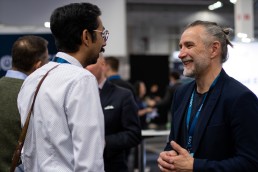
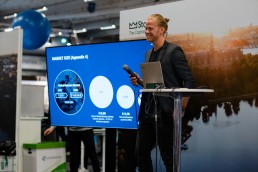
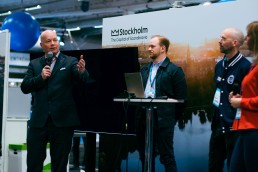
Empowering the next generation of tech
April 15, 2025articleKista Science City,Community
Some of the key partners of the STEM-Initiative at the kick-of on April 14 2025. Anders Österberg – Acting Mayor of Stockholm, Anders Österlund – Head of employer branding and people experience, Ericsson Sweden and Magnus Breitholtz – Senior advisor to the president of Stckholm University and Chairman of Vetenskapens Hus.
Swedish version below / Svensk version finns nedan
Kista Science City is working together with KTH, Stockholm University, the City of Stockholm, and the local Kista ecosystem in addressing the growing shortage in STEM related competencies. Our goal is to collaborate across, and strengthen, the entire chain—from primary and secondary education to higher education. If we don’t act now, Sweden’s role as a leading nation in innovation and engineering is at risk.
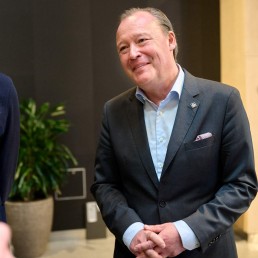
One of the key partners of the STEM-Initiative at the kick-of on April 14 2025. Mikael Lindström – Deputy President of KTH.
This initiative is a long-term investment in tomorrow’s talent, helping them understand and make the most of their opportunities. We do so by highlighting inspiring stories and examples from both academia and industry. Järva, with its large proportion of young people and its proximity to Kista, is the perfect location for our preliminary study. Here, we will gather examples of good practices and develop methods to boost the implementation of Sweden’s national STEM strategy.
“We want to create an inclusive environment where everyone can help shape the future of technology. This isn’t just about encouraging STEM studies—it’s about offering pathways to a meaningful career in tech. Through purposeful collaboration focused on our youth, we are creating better opportunities for the entire sector,” says Karin Bengtsson, CEO of Kista Science City.
Access to talent is a crucial issue for Swedish growth and European resilience in an increasingly turbulent world. We have several tech-intensive sectors that are growing while also undergoing a generational shift, where existing expertise must be replaced with new talent. Here lies the challenge of attracting fresh talent and facilitating knowledge transfer as early as possible.
We invite both established players and new visionaries to join us in shaping the future of technology. Together, we can create a robust, innovative sector where tomorrow’s challenges are met with the right skills and passion.
Our first activity is the Tech Day where 120 students from grades 7–8 meet inspiring industry leaders and tech entrepreneurs in Kista on May 15. Your company could easily become a part of this movement by e.g. participating in a workshop, joining the students for lunch or hosting an Inspiring company visit.
To know more about how this might work, please contact Project Mananger nellie.strand (at) kista.com
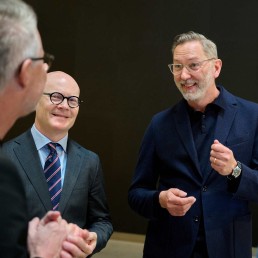
Some of the key partners of the STEM-Initiative at the kick-of on April 14 2025. Fredrik Boström – Superintendent Järva, City of Stockholm and Anders Österlund – Head of employer branding and people experience, Ericsson Sweden.
Kraftsamling för nästa tech-generation
Kista Science City arbetar tillsammans med KTH, Stockholms Universitet, staden och det lokala ekosystemet i Kista för att möta den växande kompetensbristen inom teknik. Syftet är att samverka inom och stärka hela kedjan från grund- och gymnasieskolan till universitet och högskola. Om vi inte agerar nu står Sveriges roll som framstående innovations- och ingenjörsnation på spel.
Initiativet är en långsiktig satsning där vi gemensamt investerar i framtidens talanger och hjälper dem att både förstå och ta vara på sina möjligheter. Genom att lyfta fram inspirerande exempel från både akademin och näringslivet visar vi att passion och engagemang finns här – oavsett var en bor. Järva, med sin stora andel unga och närhet till Kista, utgör en idealisk plats för vår förstudie. Här samlar vi exempel på effektiva insatser och utvecklar metoder som stärker implementeringen av Sveriges nationella STEM-strategi.
”Vi vill skapa en inkluderande miljö där alla kan vara med och forma framtidens tekniska landskap. Detta handlar inte bara om att uppmuntra STEM-studier, utan också om att erbjuda vägar till en meningsfull karriär inom tech. Genom ett målmedvetet samarbete kring våra unga skapar vi bättre möjligheter för hela sektorn,” säger Karin Bengtsson, VD på Kista Science City.
God tillgång till kompetens är en ödesfråga för svensk tillväxt och europeisk motståndskraft i en alltmer turbulent samtid. Vi har flera teknikintensiva sektorer som växer och samtidigt genomgår generationsskiften där befintlig kompetens behöver ersättas. Här finns det både en utmaning i att attrahera ny talang och i att möjliggöra kunskapsöverföringen på bästa sätt tidigt.
Vi bjuder in både etablerade aktörer och nya visionärer att vara med och forma framtiden för teknik. Tillsammans kan vi skapa en robust, innovativ sektor där framtidens utmaningar möts med rätt kompetens och engagemang.
Som ett första steg i denna satsning ordnar vi Techdagen den 15 maj. Då välkomnar vi 120 elever från årskurs sju och åtta till Kista, för att möta näringslivet och bli inspirerade. Genom att exempelvis delta i en workshop, luncha med eleverna eller stå som värd för en inspirationsträff kan ditt företag kan enkelt bli en del av detta.
Vill du veta mer om hur det skulle kunna gå till, skriv till projektledare nellie.strand (at) kista.com
Driving the future: Insights from Future 5G Ride
April 14, 2025articleSmart city,Kista Science City,5G Ride
How can autonomous vehicles be safely integrated into public transport systems? And what does it take to manage them without a driver behind the wheel?
Over the past 3.5 years, the Future 5G Ride project has explored these questions—serving as a testbed for connected, driverless mobility. It combined 5G, AI, and smart infrastructure to investigate how autonomous vehicles can operate safely as part of a broader transport ecosystem. This included coordination between vehicles, infrastructure, and the digital systems used for supervision and traffic management.
Led by Kista Science City and involving a broad mix of partners from industry, academia, and public transport, Future 5G Ride focused on practical integration. Vehicles, sensors, and operations were connected and tested together to explore how autonomy could work at scale.
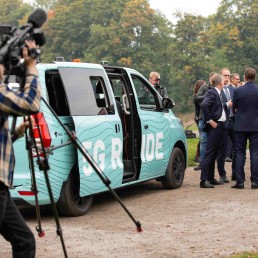
What we learned
Autonomy begins with the system
A key lesson from Future 5G Ride is that autonomous public transport can’t rely on vehicle intelligence alone. To be safe, scalable, and effective, it needs to be part of a larger system—connected not just to other vehicles, but to roadside infrastructure and human operators.
The testbed explored what that system looks like in practice: vehicles, infrastructure sensors, and control centers working as one. This fleet-based model makes it possible to coordinate operations centrally, respond in real time, and scale autonomy for everyday use in public transport.
Safety comes from shared awareness
Future 5G Ride showed how combining infrastructure sensors with AI-supported monitoring can address two distinct safety challenges in driverless public transport: situational awareness around the vehicle, and passenger safety inside it.
Roadside sensors helped detect pedestrians and traffic changes, extending the vehicle’s awareness beyond what onboard systems could see. This improved its ability to respond to external conditions in real time. Inside the vehicle, AI-assisted monitoring focused on passenger well-being—detecting incidents or unusual behavior that could require remote intervention.
Together, these capabilities showed how operations can be safely supervised from a distance, reducing the need for onboard staff while improving working conditions overall.
“To be safe, efficient and comfortable in intensive urban traffic, autonomous vehicles need to be aware of all surrounding road users,” says Dr. Yuri Tarakanov, Research Manager at Viscando. “Future 5G Ride gave us the chance to demonstrate how infrastructure sensors can extend the situational awareness of autonomous buses—especially in dense urban settings where vulnerable road users and cars can be hidden from the autonomous vehicle by for example building walls or vegetation.”
Reliable connectivity is the key to future deployment
The testbed made clear that real-time autonomy only works when networks are ready for it. Remote supervision, live data-sharing, and system-wide coordination all depend on robust, low-latency communication, especially in complex urban settings. By testing both public and private 5G networks, the project highlighted what reliable connectivity actually looks like in practice—and why continued network development is critical to scaling autonomous transport beyond isolated pilots.
Collaboration that drives innovation
Future 5G Ride brought together partners from across sectors—each contributing the capabilities needed to develop, test, and validate autonomous transport in operational settings:
- Tech leaders (Ericsson, Telia, Intel) provided advanced 5G and AI capabilities.
- Innovative scale-ups (Applied Autonomy, Viscando) introduced new solutions and fresh perspectives.
- Public transport authorities (Vy, Region Stockholm) ensured the project’s relevance and practicality in real-world conditions.
- Academic research institutions (KTH, ITRL) provided insights into societal impact, human interaction, and scalability.
“Future 5G Ride gave us valuable confirmation of how to work across the value chain. The experience has helped us scale cybersecure, operational solutions across Sweden and internationally—and we’re happy to share what we’ve learned to support safer, more sustainable mobility.” — Olav Madland, CEO of Applied Autonomy.
The road to deployment
Future 5G Ride is now complete—but its outcomes point forward.
By deploying autonomous public transport in active traffic scenarios, the testbed helped show what it takes to move from isolated pilots to scalable, system-level solutions. It validated core technologies and clarified what’s still needed to make autonomous public transport a part of everyday life.
To move from testing to widespread use, several things still need to be in place:
- Scalable integration of autonomous systems across cities and public transport networks
- Robust 5G infrastructure across more geographic areas and real-world use cases.
- Clear policy frameworks to support safe, large-scale deployment
- Public trust to enable adoption and long-term success.
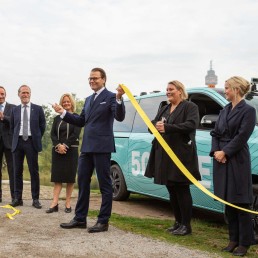
“HRH Prince Daniel at the launch of Future 5G Ride, 24 September 2020. Autonomous transport has come a long way since.”
“Future 5G Ride has shown what it really takes to make autonomous public transport work — not just removing the driver, but rethinking the entire system around them. By combining 5G connectivity, AI monitoring, and remote supervision with a strong collaborative model, we’ve shown how we can build systems that can truly move public transport forward.” — Lucas Uhlén, Project Manager at Kista Science City.
As coordinator of Future 5G Ride, Kista Science City helped bring together partners from across sectors—creating the conditions for practical testing, shared learning, and long-term collaboration. We’ll continue to support initiatives like this to strengthen Sweden’s role in mobility innovation.
Want to get involved?
Reach out to Lucas Uhlén at lucas.uhlen@kista.com
Riding backwards into the future
April 10, 2025articleCybersecurity,Kista Science City
Staff perspective:
Key takeaways from Forum International de la Cybersécurité 2025 in Lille!
Kista Science City’s Sakarias Strand attended Forum International de la Cybersécurité 2025 (InCyber Forum) in Lille as the only Swedish delegate. In this firsthand report, he highlights Europe’s leading cybersecurity strategies, emerging trends, and practical innovations—and explores how Sweden can accelerate its own cybersecurity readiness by learning from front-runners like France and Belgium.
—
4 April, 2025
As I sat backwards on the high-speed train from Lille to Charles de Gaulle, laptop balanced on my knees, the moment felt symbolic. The movement mirrored the difference I often sense when returning to Sweden’s cybersecurity conversation. While France charges ahead with integration, collaboration, and AI-driven innovation, Sweden seem stuck—awaiting clearer guidance, focused on compliance checklists and vendor comparisons.
Held in Lille, France’s rising capital of cybersecurity, InCyber Forum gathered over 20,000 attendees from 103 countries, plus another 4,000 online. It was a dense, intense, expertly curated three-day event. Attendees sat on floors, feverishly taking notes, absorbing intelligence you simply won’t find on Google. Many talks enforced strict photo bans—for good reason.
It was an honor to be the only Swedish delegate, invited by Business France as part of their France 2030 program. Being there in person—surrounded by global frontrunners and firsthand innovation—offered a rare window into how fast the field is evolving.
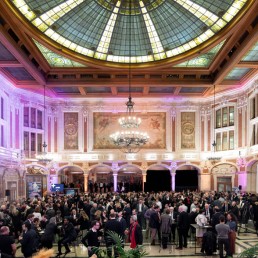
photo credit: InCyber Forum
France leads by doing: Cybersecurity as a national priority
France isn’t just theorizing cybersecurity—it’s funding, implementing, and operationalizing it. The 2021–2025 National Cyber Plan has already spawned 50 consortiums, with new cyber unicorns emerging through state-backed incubators like Cyber Booster. The result is a highly curated cyber economy where integration trumps invention, and commercialization—not just research—is the benchmark of success.
Through initiatives like the France 2030 export program and a growing network of national Cyber Campuses, France connects government, defense, academia, and industry. The goal isn’t just to study threats—it’s to actively deploy integrated, scalable solutions. In parallel, France is realigning cybersecurity education with industry needs, prioritizing hands-on skills and real-world problem-solving that prepares graduates to meet live threats from day one.
The key difference from Sweden? French actors aren’t waiting for another strategy paper—they’re already running.
A standout trend at the forum was the mature integration of AI-driven solutions—often without explicitly marketing themselves as ‘AI.’ Rather than pushing consulting or certifications, exhibitors showcased integrated technologies built on open-source intelligence. Behind the scenes, Large Language Models (LLMs) support tasks like vulnerability triage, risk modeling, OSINT, and attacker simulations.
Belgium’s NIS2 certification framework: A model for Europe
While France leads on integration and support structures, Belgium is gaining attention for its regulatory-first NIS2 approach. Since October 2024, more than 4,500 Belgian organizations have registered under a new classification system that sorts them by criticality. Each category comes with specific obligations and certification levels, giving companies a clear picture of what’s expected. This structure improves national oversight and is already viewed as a potential blueprint for harmonizing cybersecurity rules across the EU.
Instead of vague timelines or ad-hoc requirements, Belgium has mapped out a clear seven-step compliance journey—from registration and incident reporting to board-level training and third-party certification.
Supporting this is CyberFundamentals (CyFun®), a national framework from the Centre for Cybersecurity Belgium (CCB). It helps organizations navigate risk-based security levels with tools like self-assessment templates, sector-specific guidance, and optional audits. The approach lowers the threshold for smaller players while setting higher expectations for the most critical ones—creating a common playbook for SMEs, regulators, and essential service providers alike.
Meanwhile in Sweden, NIS2 transposition remains pending—expected by summer 2025 at the earliest. With the European Commission already launching infringement procedures against 23 Member States, one hopes we finalize NIS2 before NIS3 comes knocking.
Looking ahead
InCyber Forum offered a glimpse of the future—and revealed who’s already living it. The contrast with Sweden is striking. While Swedish actors often await clearer national directives before acting, countries like Belgium and France are already moving. They collaborate across sectors, fund scale-ups, and embed cybersecurity into their national growth strategies.
One thing became increasingly clear at the forum: cybersecurity is no longer about checklists or compliance alone. The threat landscape is fluid and weaponized. AI is now standard in both defense and attack. Deepfakes spread disinformation at speed. State and non-state actors blend tactics, and no company is too small to target.
Yet some of the most valuable moments didn’t happen in official sessions. They emerged on the expo floor, in hallway conversations, and online follow-ups.
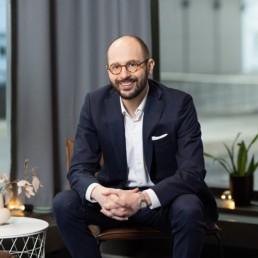
Sakarias Strand, Kista Science City, Project Manager for Sweden Secure Tech Hub
I return to Stockholm with a long list of promising contacts and collaborations—proof that insights often surfaces between the sessions.
As I’m writing this, I see Sweden’s new National Cybersecurity Strategy for 2025–2029 being released. It’s a timely document, with encouraging signals: stronger public-private collaboration, clearer responsibilities, and an ambition to align with Europe’s evolving threat landscape. If taken seriously, it can serve as a lever for real change—and a crucial boost in resilience, especially for SMEs.
Sweden has the talent and ambition to lead. But we need to move faster. The question isn’t whether we catch up—it’s whether we can afford not to. As we consider our next steps, we must ask ourselves: Are we prepared to treat cybersecurity as both an economic multiplier and security imperative? In a world of frenemies, deepfakes, and digital sabotage, neutrality isn’t an option. Compliance is a great tool—if our only threat is the government. But it’s not.
It’s time to catch up!
Text: Sakarias Strand, Kista Science City
Kista Science City selects ten scaleups for Access UK
March 11, 2025articleKista Science City,Scale Hub
The lineup is set! Kista Science City is backing ten cutting-edge Swedish scaleups as they take their next step toward international expansion. Through Access UK, a tailored programme to fast-track UK market entry, these companies will gain the insights, connections, and strategic support needed to scale. In June, they will head to London for three days of high-level meetings with potential customers, investors, and industry experts.
Meet the companies
The selected scaleups bring transformative solutions to a range of industries, from sustainable materials and mobility to IoT and deep tech. Each company has been chosen for its potential to thrive in the UK market and make a lasting impact in its sector.
We welcome:
- Clean Motion: Ultra-light electric vehicles designed for minimal energy consumption in urban transport.
- MyVox: MEMS-microphone technology improving audio quality across consumer and industrial applications.
- TeraSi: Advanced semiconductor components enabling faster, more stable wireless communication.
- Flic: Wireless buttons simplifying IoT automation and smart home control.
- Proptivity: Future-proofed indoor connectivity solutions with high-performance 5G networks.
- Cemvision: Climate-neutral cement solutions revolutionizing the construction industry.
- Relox Robotics: Autonomous robots optimizing golf ball collection for efficiency and precision.
- Greeniron: Fossil-free metal recycling, reducing emissions in the steel sector.
- Brinja: IoT-driven safety solutions enhancing real-time monitoring on construction sites.
- Univrses: AI-powered computer vision for real-time urban traffic data and smart city development.
For Nicolas Bec, Chief Commercial Officer at Cemvision, Access UK presents an important opportunity to deepen market understanding and build new relationships:
“The UK is a priority market for us, and we took our first step earlier this year through a partnership with EQT Exeter. We see great potential for continued growth, driven by a strong market and new regulations that promote sustainable cement solutions like ours. Access UK will be an important opportunity to deepen our understanding of market conditions and regulations while building valuable relationships for the future,” says Bec.
Access UK: Tailored market entry
Expanding into a new market comes with challenges—from navigating regulations to building the right partnerships. Access UK is designed to support companies at different stages of their international journey: it helps those preparing for expansion take their first step into the UK, while accelerating the growth of businesses already establishing themselves in the market.
The programme consists of two phases: a preparation programme in Sweden followed by the in-market visit to London. This approach ensures participating scaleups gain both strategic insights and hands-on experience, making their market entry more effective.
Throughout the programme, they will receive:
- Exclusive meetings with key customers, partners and/or investors.
- Practical insights into navigating the UK business landscape.
- Workshops to refine communication and market positioning.
“It can take a long time for deep tech companies to enter new markets, and our mission is to shorten that process,” says Arash Sangari, Program Manager at Kista Science City. In an interview with Impact Loop, he discussed the challenges scaleups face and the need for smarter market entry strategies: “We simplify access to key contacts and help companies get what they need. Many deep tech startups struggle to even explain what they do, so there’s great value in sharpening their communication and making the right connections. Three days in this environment can save companies six months of mistakes.”
Access UK is designed for fast-scaling deep tech, hardware, and B2B businesses that have already prepared for UK expansion. Through tailored support, the programme ensures companies to maximize their market entry efforts. The selected companies range in size from 8 to 60 employees and are part of Kista Science City’s community—though not necessarily based in Kista.
Access UK is run by Kista Science City in partnership with the Swedish Chamber of Commerce for the UK and Department for Business and Trade at the British Embassy in Stockholm.
Next Stop: Germany
While Access UK kicks off in June, another opportunity is now open for Swedish scaleups looking to expand into one of Europe’s largest economies. Access Germany—scheduled for October 2025—offers a similar tailored programme, providing selected deep tech and hardware companies from the Stockholm region with market insights, key industry connections, and strategic support to establish a foothold in Germany.
Companies interested in Access Germany can apply now!
The Access UK and Access Germany programmes are funded by the Region of Stockholm and the European Union.
Building resilience: Cybersecurity innovation in Kista
March 6, 2025Kista Science City,articleCybersecurity
Cybersecurity is a key part of the modern digital landscape. As technology evolves, so do cyber threats—making security a top priority for businesses, governments, and researchers alike. With threats becoming more sophisticated, the need for robust security measures is greater than ever.
In Kista, these challenges are being met with action. Home to a dense concentration of cybersecurity experts, research institutions, and pioneering tech companies, the area plays a fundamental role in advancing Sweden’s digital security. Here, local organizations collaborate to develop, test, and implement cutting-edge security solutions that help protect businesses and society from emerging threats.
These efforts take different forms—from testing environments that simulate cyber threats to national initiatives helping businesses build stronger digital defenses. Below, we take a closer look at some of the key projects driving cybersecurity innovation in Kista.
H2 – Cyber Range: Test bed for cybersecurity
Cyber Range is a RISE-led test bed where companies and organizations can build fully controlled virtual environments to assess, test, and secure IT systems. It provides tools for testing new system components, ensuring correct implementation, and identifying vulnerabilities before they can be exploited.
Beyond technical testing, Cyber Range also provides a controlled setting where organizations can evaluate security routines and response strategies under realistic conditions. As digital threats evolve, test environments like this help organizations stay ahead of cyber risks.
Sweden’s Civil Minister Erik Slottner recently visited Kista and Cyber Range to get a firsthand look at these efforts. During his visit, he emphasized the growing need for proactive defenses to protect both public and private sectors. He also highlighted that Sweden’s cybersecurity progress depends on collaboration—bringing together industry, research institutions, and policymakers to strengthen national resilience.
H2 – Sweden Secure Tech Hub: Making cybersecurity accessible
For many small and medium-sized enterprises (SMEs), cybersecurity can feel overwhelming—full of technical complexity, regulatory challenges, and financial barriers. Unlike larger companies with dedicated security teams, these businesses often lack the resources to build strong digital defences. Yet they are just as vulnerable to attacks.
Sweden Secure Tech Hub helps bridge this security gap. Led by Kista Science City and five other science parks, this national initiative provides targeted support, equipping businesses with the knowledge and tools needed to strengthen their cybersecurity. Through its programs, Sweden Secure Tech Hub provides:
- Need analysis – A structured evaluation that helps businesses identify security gaps and areas for improvement.
- Expert advice – Professional guidance tailored to an SME’s specific security challenges and industry requirements.
- Testing – Controlled cybersecurity assessments that detect vulnerabilities before they become serious threats.
- Networking – Opportunities to collaborate with cybersecurity specialists, technology providers, and other businesses navigating similar security challenges.
By making cybersecurity expertise more accessible and actionable, Sweden Secure Tech Hub ensures that digital security isn’t just for large corporations—it’s within reach for every business that needs to protect itself and its customers.
H2 – Basic Cybersecurity: A hands-on course for SMEs
To help SMEs translate cybersecurity knowledge into action, Kista Science City is co-organizing a free, instructor-led training program designed specifically for small and medium-sized businesses. Developed by Linköping University and Linköping Science Park, the course provides guidance on preventing and responding to cyber threats.
Basic Cybersecurity equips businesses with practical skills to integrate security into their daily operations. Over four workshops, participants will learn how to:
- Identify cybersecurity risks that could threaten their business.
- Apply key security principles to prevent attacks before they happen.
- Develop a security-first mindset across their organization.
- Respond effectively to incidents to minimize damage and recovery time.
The course is held on-site in Kista, offering an interactive learning environment with real-world applications. Fully funded through Sweden Secure Tech Hub, it is free of charge, with applications open until 11 March, 2025.
Limited spots available—Read more and apply today!
For questions, contact Sakarias Strand, Kista Science City: sakarias.strand@kista.com
Innovation and Defence: NATO Innovation Fund in Kista
February 4, 2025Kista Science City,Defence,Scale Hub,articleCybersecurity
How can innovation help build resilience in an unpredictable world? For the NATO Innovation Fund (NIF), the answer lies in cross-sectoral collaboration—connecting the brightest minds in tech with defence stakeholders to tackle evolving security challenges. This mission brought NIF to Kista Science City where some of the country’s leading deep-tech companies took center stage.
NIF: Investing in resilience
The NATO Innovation Fund is the world’s first multi-sovereign venture capital fund, backed by 24 member nations and equipped with €1 billion to deploy over 15 years. Its mission: to support early-stage European tech companies developing solutions that strengthen resilience and security across the Alliance.
Sweden, NATO’s newest member state and home to one of Europe’s most established venture ecosystems, was a natural choice for this engagement. “Sweden has had great success in innovation and scaling companies globally,” said Patrick Schneider-Sikorsky of NATO Innovation Fund. “The frameworks here make it an exceptional place to do business. We look to invest in early-stage, breakthrough solutions, and Sweden offers outstanding potential for innovation.”
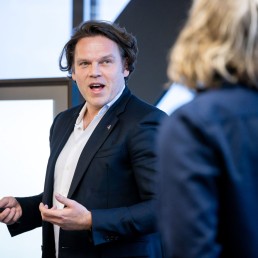
Patrick Schneider-Sakorzky, Partner at Nato Innovation Fund
Pioneering tech on display
Kista was one of only two stops on NIF’s Sweden tour, chosen for its strong ecosystem of deep-tech companies. The visit was part of their broader strategy to identify and invest in dual-use technologies—solutions with applications in both civilian and defence settings. These technologies are key to addressing modern security challenges, from safeguarding critical infrastructure to enhancing resilience against cyber threats.
During the event, 10 Stockholm-based companies presented their solutions. These included technologies in autonomous systems, energy solutions, advanced materials, and next-gen communication technologies. Here’s how three of these companies are driving innovation that could support security and resilience efforts:
Ovzon: Resilient satellite communications
Ovzon presented its advanced satellite system, designed to ensure secure communication in contested environments and enabling multi-domain operations. With features like GPS-denial resilience, ultra-mobile terminals and full sovereign control, Ovzon’s technology supports NATO Innovation Fund’s mission to enhance resilience and build next-generation communication systems. “Secure, reliable communication is critical for defence operations, and our technology addresses those needs, already today in the most demanding environments,” said Per Wahlberg, Deputy CEO of Ovzon.
Papershell: Next-gen lightweight materials
Papershell introduced its biogenic material that is lighter than aluminum, stronger than plastic, and 100% fossil-free. With automated, flexible production in Sweden, it can rapidly scale for applications across industries, ranging from automotive to drone manufacturing. The company’s innovation aligns with NATO Innovation Fund’s focus
on resource sustainment for defence and civil needs. “By using locally sourced input materials, we create a 100% biogenic, fossil carbon-free alternative—proving that sustainability and resilience go hand in hand,” said Anders Breitholtz, CEO of Papershell.
As the company scales production, its goal is to provide one of the market’s cheapest load-bearing materials, making it a cost-effective alternative to traditional composites. This would help member nations reduce reliance on foreign-subsidized materials while significantly cutting emissions.
TeraSi: Compact and secure connectivity solutions
TeraSi showcased its RF modules, capable of securely transferring large volumes of data, even on moving platforms like drones. The compact design and efficiency of this technology directly support NATO Innovation Fund’s goal of advancing secure, deployable communication systems for defence operations. “Connectivity is vital for protecting critical assets, and our solutions make it possible to securely transfer data across domains,” said James Campion, CEO of TeraSi.
With ambitions to enable seamless data transfer across air, space, and terrestrial networks, TeraSi is paving the way for fiber-like connectivity in dynamic environments. Read Dagens Industri’s interview with CEO James Campion to learn more about the company’s advancements (subscription required).
Key takeaways from the event
NATO Innovation Fund’s visit to Kista Science City underscored an important shift: private sector innovation is now a driving force in modern security and defence. As security threats evolve, so must the solutions, and effective collaboration between innovators and defence stakeholders is essential to staying ahead. Here’s what we know:
- Sweden’s NATO membership is unlocking opportunities for its tech industry. Since joining the Alliance in March 2024, Swedish tech companies have new pathways to contribute on a global scale—not only in security and defence but also in strengthening international partnerships and knowledge-sharing across borders.
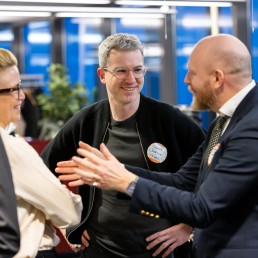
- Bridging private-sector innovation with defence needs is essential. As security challenges evolve, so does the need for cutting-edge solutions—many of which now emerge from the private sector. Stronger collaboration between startups, investors, and defence stakeholders ensures that these innovations are developed, scaled, and deployed where they can have the greatest impact.
- Adaptable technology is key to building resilience in an unpredictable world. Modern security threats are increasingly complex, spanning cyber risks, physical vulnerabilities, and shifting global tensions. To stay ahead, defence and security systems must integrate flexible, dual-use technologies that can evolve alongside emerging challenges.
Our commitment
Sweden’s innovation ecosystem is becoming increasingly connected to the international defence landscape, and Kista Science City is part of that process. We work closely with tech innovators, investors, and global defence stakeholders—helping companies navigate regulatory landscapes, secure funding, and build strategic partnerships that drive meaningful impact.
Do you want to get involved? Reach out to sakarias.strand@kista.com to explore opportunities for collaboration!
Strengthen your cybersecurity skills
February 3, 2025article,Cybersecurityproject
Strengthen your cybersecurity skills
If digitalization is a central part of your business model, increasing your cybersecurity expertise is crucial for growth. Our course Basic Cybersecurity provides a practical understanding of cybersecurity, strengthening both your security awareness and strategic approach to threats.
The course is designed for small and medium-sized enterprises, focusing on practical measures and solutions that can be implemented immediately. You will gain tools to identify and prevent potential risks, as well as effectively manage incidents and minimize costly security breaches.
Enhancing your cybersecurity not only protects your business but also helps attract new customers, meet regulatory requirements, and build trust in your operations. The course also offers a valuable opportunity to connect with other companies facing similar challenges.
Developed by Linköping University and Linköping Science Park, the course runs in April and May 2025 and consists of four instructor-led workshops combined with self-study.
The course is held in Swedish.
As co-organizer, Kista Science City is now offering a limited number of free spots for this popular course.
Secure a strategic market advantage and strengthen your security culture – Register by 11 March, 2025!
Why take this course
After completing the course, you will be able to:
- Describe how cyberattacks can impact society and individual organizations
- Explain key cybersecurity and risk management concepts
- Conduct basic risk assessments and identify areas requiring deeper analysis
- Understand and describe the foundations of a strong cybersecurity culture
How the course is build
- Cybersecurity in a societal context (history, threats, regulations)
- Fundamental concepts (risks, threat models, protective measures)
- Risk management (methods, roles, responsibilities)
- Cybersecurity culture (human factors, incident response)
Who this course is for
Small and medium-sized tech companies looking to strengthen their cybersecurity are welcome to sign up employees. Participants must be registered by their employer.
Please note that the course is not open to individuals or sole proprietors (enskilda firmor)
The application deadline is 11 March, 2025!

Dates
Workshop 1: 8 April 2025, 9:00–12:00
Workshop 2: 28 April 2025, 9:00–12:00
Workshop 3: 14 May 2025, 9:00–12:00
Workshop 4: 28 May 2025, 9:00–12:00
The course takes place on-site at Kista Science City.
Course Format
Structure: Four instructor-led workshops + self-study
Participants will receive 3 ECTS credits (högskolepoäng) after completing the following parts:
Active participation: 1.5 ECTS (minimum 75% attendance at workshops)
Written individual assignment: 1.5 ECTS (graded pass/fail)
Organizers
The course is organized by Linköping University and Linköping Science Park (Sweden Secure Tech Hub), with Kista Science City and several other Science Parks in Sweden as co-organizers.
Course Instructor
Associate Professor Mikael Asplund, Linköping University
Questions?
For inquiries about available spots or other details, please contact Sakarias Strand, Kista Science City (sakarias.strand@kista.com)
This course is part of the Sweden ICT initiative, aimed at strengthening Sweden’s position as a leading ICT nation. The initiative focuses on attracting talent, supporting innovation, and sharing knowledge in AI, Cybersecurity, and IoT.

Future-proofing Sweden’s cyber defenses
October 30, 2024Kista Science City,Community,articleCybersecurity
Future-proofing Sweden’s cyber defenses
As Sweden’s digital infrastructure grows, so do the risks to many critical services. From hospitals and banks to energy grids and transportation systems, cyber threats targeting essential systems are on the rise, posing significant dangers to national security. Yet, despite these risks, some experts argue that Sweden’s current cybersecurity policies are insufficient, leaving many organizations vulnerable.
In a recent article, Kista-based cybersecurity researcher Gazmend Huskaj underscores that many Swedish organizations, large and small, are underprepared for digital threats. Without solid security strategies and frameworks in place, these organizations could face major disruptions from cyberattacks, putting critical services at risk. And these risks are not just theoretical—recent incidents in other countries have shown how devastating such attacks can be.
What steps can Sweden take?
Huskaj points to the importance of a coordinated national response. Strengthening Sweden’s cybersecurity will require more than government action alone. It will involve collaboration between the public and private sectors, as well as academia, to create open channels for sharing knowledge and responding swiftly to emerging threats. Key areas to address include:
- Cross-sector collaboration: Open communication between industries, government, and academia is critical to building a robust defense.
- A clear national strategy: Defining Sweden’s approach to both defensive and offensive cybersecurity measures is crucial for long-term security.
- Preparedness at all levels: Ensuring that all organizations, large or small, have strong cybersecurity measures is vital for safeguarding critical infrastructure.
In today’s digital world, a combined cybersecurity effort is essential for protecting Sweden’s future. Kista is becoming a national powerhouse for cybersecurity, where a growing node of companies, actors, and initiatives wants to raise the cybersecurity awareness of Swedish businesses and public sector. RISE Cybersecurity center is leading the way, but also supported by the strong research at the Department of Department of Computer and Systems Sciences at Stockholm University, FOI, and several businesses with competence in the field.
Do you want to get involved in Kista Science City’s cybersecurity initiatives? Reach out tosakarias.strand@kista.com today!
Mycronic expands to Kista, strengthening the local semiconductor ecosystem
October 28, 2024Community,articleKista Science City
Mycronic expands to Kista, strengthening the local semiconductor ecosystem
Mycronic, a global leader in manufacturing equipment for the electronics and semiconductor industries, is relocating its High Flex division to Kista. This division specializes in advanced solutions for flexible production and electronics manufacturing.
With its technology emerging from RnD at KTH (Royal institute of Technology) Mycronic’s arrival will further boost the local semiconductor ecosystem. The move fosters collaboration and innovation. It also brings great value in terms of Mycronics strong focus on sustainability and diversity, all together creating new possibilities for cutting-edge developments in electronics manufacturing.
Their new space in Kista will house offices, production facilities, and storage, supporting Mycronic’s continued growth and technological advancements.
Welcome to Kista, Mycronic!
Next-gen innovators solve real-world needs in Kista
October 1, 2024articleKista Science City,Community
Next-gen innovators solve real-world needs in Kista
This summer, 125 young people from across Stockholm had the opportunity to participate in a program developing their entreprenurial skills. With key activities taking place in Kista, the program gave participants the opportunity to engage with real-world societal issues presented by the City of Stockholm. This initiative is part of a broader effort to engage with youth and connect them with students, businesses, local authorities, and academic institutions in Kista.
Community engagement
The program, run by Rookie Startups, engaged people aged 15-19, giving them the opportunity to go beyond theoretical ideas and work hands-on with challenges directly impacting the city. Collaborating with departments in areas like environmental protection, culture, and urban development, they were tasked with solving practical issues affecting the community.
This partnership enriched the projects with fresh perspectives while offering the youth hands-on experience in addressing public sector challenges. “The collaboration not only helped the participants develop their own skills but also provided these departments with valuable insights from a younger perspective,” notes Emma Roxtröm, project leader at Rookie Startups.
Throughout the program, Rookie Startups provided essential support in terms of resources, guidance, and aligning the program with broader educational goals. This support has been crucial in ensuring the program’s success, helping to prepare the participants for future careers while aligning with the city’s vision of creating a vibrant, innovative community.
The impact of the program
Throughout the program, participants made significant strides, with 97% reporting increased knowledge in social entrepreneurship and concept development, and 91% noting personal growth. “We’re incredibly proud to see how much these young people have developed, both professionally and personally. They’ve gained invaluable experience in entrepreneurship and have developed the confidence to voice their ideas and participate actively in their communities,” says My Ekstrand, CEO of Rookie Startups.
Beyond individual development, the program plays a key role in strengthening community bonds across Stockholm. The 125 participants were employed by all 11 district administrations across the city, with many of them visiting Kista for the first time. “We’re excited to welcome more young people to Kista and introduce them to the wide range of opportunities here, from education to career paths in the tech industry,” says Mikaela Färnqvist of Kista Science City.
Want to help shape the future of Kista? Reach out to learn how your organization can get involved: mikaela.farnqvist@kista.com
